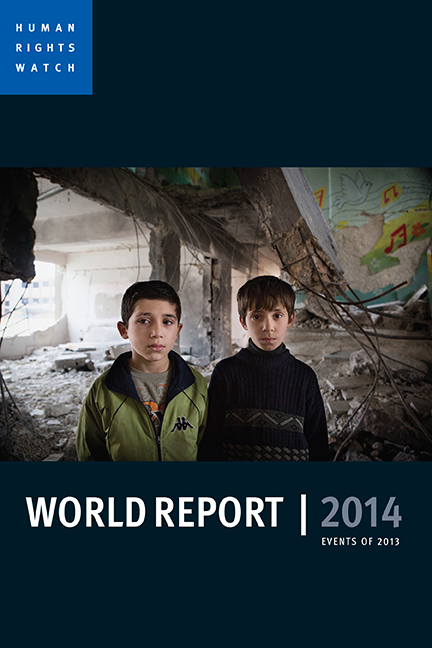Book contents
- Frontmatter
- Dedication
- HUMAN RIGHTS WATCH
- Table of Contents
- Foreword
- Rights Struggles of 2013: Stopping Mass Atrocities, Majority Bullying, and Abusive Counterterrorism
- The Human Rights Case for Drug Reform How Drug Criminalization Destroys Lives, Feeds Abuses, and Subverts the Rule of Law
- Putting Development to Rights: Integrating Rights into a Post-2015 Agenda
- The Right Whose Time Has Come (Again) Privacy in the Age of Surveillance
- Photo Essays
- AFRICA
- AMERICAS
- ASIA
- EUROPE AND CENTRAL ASIA
- MIDDLE EAST AND NORTH AFRICA
- UNITED STATES AND CANADA
- 2013 HUMAN RIGHTS WATCH PUBLICATIONS
- Acknowledgments
South Africa
Published online by Cambridge University Press: 07 May 2022
- Frontmatter
- Dedication
- HUMAN RIGHTS WATCH
- Table of Contents
- Foreword
- Rights Struggles of 2013: Stopping Mass Atrocities, Majority Bullying, and Abusive Counterterrorism
- The Human Rights Case for Drug Reform How Drug Criminalization Destroys Lives, Feeds Abuses, and Subverts the Rule of Law
- Putting Development to Rights: Integrating Rights into a Post-2015 Agenda
- The Right Whose Time Has Come (Again) Privacy in the Age of Surveillance
- Photo Essays
- AFRICA
- AMERICAS
- ASIA
- EUROPE AND CENTRAL ASIA
- MIDDLE EAST AND NORTH AFRICA
- UNITED STATES AND CANADA
- 2013 HUMAN RIGHTS WATCH PUBLICATIONS
- Acknowledgments
Summary
South Africa continues to struggle with the legacy of apartheid and the challenges relating to addressing increasing demands from its citizens for the realization of economic and social rights as well as respect for fundamental civil and political freedoms. Although the government has been relatively successful in the provision of social services, financial mismanagement, and corruption— especially at the local government level—have seriously undermined progress in effective and efficient delivery of social and economic services.
Growing disaffection with local government, increasing poverty levels, and unemployment contributed to a resurgence of threats of violence against, and attacks on, property belonging to refugees, asylum-seekers, and migrants in the Eastern Cape and Gauteng provinces.
Xenophobic Attacks
In May and June, xenophobic attacks on the businesses and homes of refugees, asylum-seekers and migrants displaced hundreds of people in Gauteng. More than 60 foreign-owned shops were forced to close following violent looting and destruction by community members in the Orange Farm and Diepsloot areas of Gauteng. In June and September, similar attacks against Somali nationals in KwaZakhele and New Brighton in Port Elizabeth, in the Eastern Cape Province, left several shops looted and burnt. Due to the level of xenophobic violence, police had to relocate some of the foreign nationals to temporary shelters.
At time of writing no one had been arrested and charged with xenophobic violence. Instead, police arrested 21 people in Gauteng and charged them with public violence and arrested about 100 others in connection with the violence in Port Elizabeth. Official statements by members of both local and central governments have denied that violence against foreign nationals has been motivated by xenophobia or other forms of intolerance. Such statements have undermined the development of an effective, long-term strategy by the police to prevent xenophobic crimes by dealing with its root causes. On the other hand, some intervention strategies planned by local authorities in the affected areas, such as awareness campaigns and peace dialogues, sought to address xenophobia.
Inquiry into Killing of Marikana Miners
The investigation into the deaths of 44 people including the police killing of 34 miners between August 11 and 16, has been obstructed by delays of the work of the Farlam Commission of Inquiry, created to investigate the killings.
- Type
- Chapter
- Information
- World Report 2014Events of 2013, pp. 168 - 173Publisher: Bristol University PressPrint publication year: 2014



